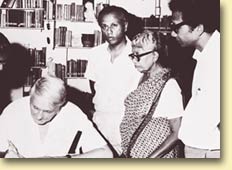Professor
Joseph Needham F.R.S.
"During my stay in Ceylon
in the spring and summer of 1958 one of the things I most enjoyed
and appreciated was the opportunity of getting to know Martin Wickramasjnghe,
one of the most outstanding of Lanka's intellectuals, a truly original
thinker and writer in literature and social studies.
In his study of the Jataka stories Wickramasinghe brings out again
and again the relationship of the problems studied in analytic and
introspective psychology of the Freudian era, and he links this
similarity with the surprising resemblances that
|
 |
| Professor Joseph
Needham F.R.S. in MW's library, prior to delivery of the inaugural,
Martin Wickramasinghe lecture. |
he finds in the novels of the Great
Russian writers
of the nineteenth century. "
(From a critical evaluation of MW's writings in English, in Joseph
Needham's Within the Four Seas)
|
| |
| Mr. V. Korchitov, |
| Editor of the journal "Problems
of Literature" |
In the late 1950's, at a time when the classical novel familiar
to most of us, was being rejected and discarded by some as an anachronism,
two events of importance in the field of literature came to my notice.
One of these events was the opportunity to read the novel 'The Leopard"
authored by a Sicilian aristocrat, Giuseppe di Lampedusa, a novel
in the familiar classical tradition. It was a novel, which received
accolades not only of Italian, but also of French, English and American
critics and readers. The reasons for its universal appeal was, I
believe, the great depth and understanding and artistic skill shown
in the presentation of the vicissitudes of a feudal class in a modernizing
world, within the microcosm of a feudal family, the ups and downs
in their circumstances, and their joys |
|
Mr. I Korchitov, President of the
soviet writers Union.
|
|
and sufferings.
|
| |
| The other important event was the
publication in 1959 of the Russian language translation of Martin
Wickramasinghe's novel "Gamperaliya", first published
in Sinhala in 1944. What struck me was the close kinship of "Gamperaliya"
in its theme, subject, high novelistic qualities and creative power
to di Lampedusa's novel, "The Leopard", the first Italian
edition of which was published in 1958, fourteen years after the
publication of Martin Wickramasinghe's "Gamperaliya". |
| |
| I consider it an honour that I can
count the great Sri Lankan writer Martin Wickramasinghe amongst
my friends. |
| |
| Professor David Jackson, |
| Department of Languages, University
of Texas |
In the context of world Literature
and intellectual history, Wickramasinghe can be compared to a generation
of self – educated writers from village or
rural origins who have brought about the modernistion of their national
literatures: Faulkner in the
USA, Ramos in Brazil, di Lampedusa in Italy.
|
|
With Professor
David Jackson, Department of Languages, University of Texas |
| |
| Visiting Professor Hao Wei Min of
China. |
| Department of Oriental Languages,
Kelaniya University. |
| |
I consider Martin Wickramasinghe
to be the greatest writer to explore the society and culture of
the
Sri Lankan people. I have read all his novels and short stories
in the original Sinhala and have grasped the diversity and depth
of the folk life re-created in them. He depicts the psycho-social
evolution of Sri Lankan society in his famous trilogy Gamperaliya,
Kaliyugaya, and Yuganthaya as eruditely as a professor of sociology.
His published works in Chinese, namely Madol Doova and a volume
of short stories are two favourite books among our readers. Martin
Wickramasinghe's Viragaya is the best novel I have read not only
in Sinhala but all other novels as well. |
|
Professor
Hao Wei Min of China. |
The foremost reason for this is that it lays bare, the inner most
thoughts and feelings of a human being disciplined by traditional
culture. Martin Wickramasinghe is recognised as the pioneer, not
only of the modern Sinhala novel, but also of modern Sinhala literary
criticism and cultural anthropology. |
| |
| Professor Eric Meyer |
| Professor of Indian History, Institute
of Oriental Languages, Paris |
| |
It is fortunate that the first Sinhala
novel to be translated into French is Viragaya by Malalagama Martin
Wickramasinghe. This beautiful book will amongst other things, help
the French reader to understand the complexities of the inner life
of a Buddhist.... The natural detachment of Aravinda makes him the
spectator of his own story. Indifferent to social conventions and
gossip, a stranger to his own destiny. As the anti-hero of Camus
could be , Aravinda is at the same time the brother of Meursault
and his anti-thesis: his non-violence is as detached as the violence
of Merusault is pointless. But Aravinda's indifference is neither
inhuman nor proud.
|
|
Book cover of French
translation of Viragaya. |
In the admirable final pages that close the story of the life of
Aravinda, Martin Wickramasinghe succeeds in bringing back to Buddhism
all its human completeness. Viragaya shows the author's deep attachment
to Buddhism, the prism through which he depicts the hidden nuances
of the Sinhalese soul |
| |
| Writer Thadushi Noguchi |
Viragaya was published in Japanese
language in the year 2002. The book launch of the translation by
Dr. Thadushi Noguchi was held in Colombo to coincide with the 50th
anniversary celebration of Japanese – Sri Lanka relations. Dr.Noguchi's
Japanese translation of Madol Doova is to be published shortly.
|
|
Book cover of Japanese
translation of Viragaya |
| |




